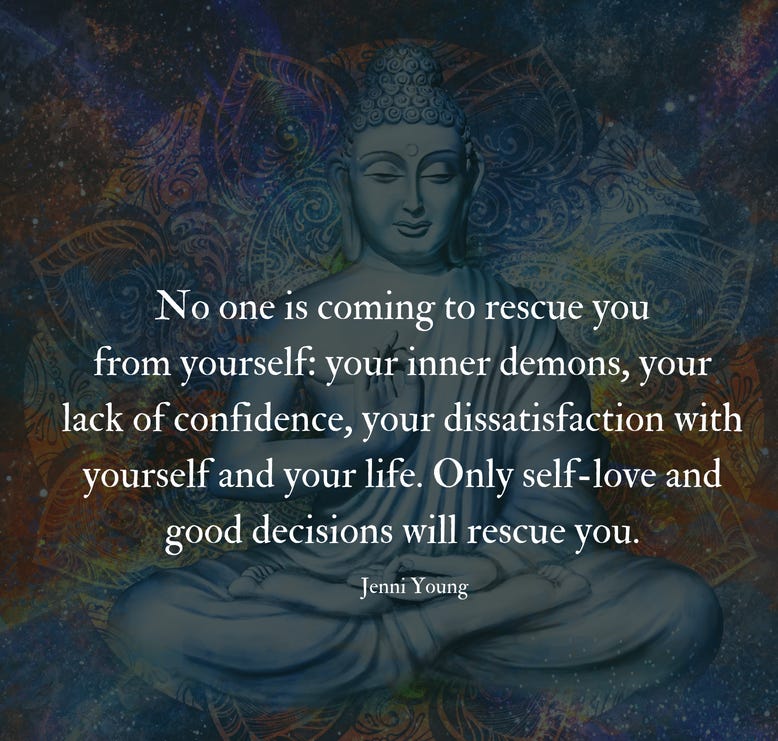19 Unspoken Mental Health Lessons Your Therapist Won't Tell You
For this article, I figured I’d share a few lessons in mental health that I’ve learned this year and in previous years that are worth repeating. These lessons are in no order of importance (that would be waaaay to much work) but are valuable, nonetheless. Some have longer explanations, others don’t because…well…they’re pretty poignant. Here you go…
There is no “I.” While we need some kind of term to refer to ourselves in our daily lexicon, there simply is no self. And what do people generally consider as the sources of self? Their physical body and senses, perceptions, feelings, strivings (i.e. ambition), and consciousness, or a fundamental awareness of everything mentioned. The only problem is, each one of these elements change. Every single one. Not one is permanent. Which means that if these are the elements that one generally believes to comprise the self, but they only exist for a moment in time (just think how your emotions fluctuate, how your body changes, feelings ebb and flow, the 12-year-old you is different from the 53 year old you), then that “self” doesn’t actually exist. Deep shit, I know. The beauty of this sense of no self (thank you, dear Buddha) is that when you embrace this reality, there’s a sea of acceptance waiting for you because you’re no longer stuck fighting for control of happiness, stress-free, pain free, anxiety-free. Because you’re already free.
Treat your mental health like your physical health. The problem with using physical metrics as a baseline for health is that they don’t reflect the whole person. Absent from physical metrics are emotions and thoughts—both of which impact one’s doing (ie. performance) and being. Instead, the typical person’s metrics for success are how good they look naked, whether they can lift heavy things, the over/under bet they have with themselves and the (weight) scale, or if that same pair of pants from last year makes their butt look big (hint: it’s not the pants). That’s not health. You could be 5% body fat with the strength to squat a Volkswagen but if you repress your emotions, keep things to yourself, engage in negative self-talk, or are always criticizing other people then, well, that’s not healthy either—not for your mind or you body. The body is a representation of the (unconscious) mind, so if you have a lot of traumas in your mind, for example, eventually that trauma gets off-loaded into the body and becomes the subconscious engine that drives anxious thoughts. Pay attention to what your body says and use it to diagnose your own mental health.
Regarding spiritual awakening... In my book Navigating Chaos: How To Find Certainty In Uncertain Situations, I identified four pillars of performance: physical, mental, emotional, spiritual. In retrospect, they’re not just drivers of performance but of health and being. Excess in one creates deficiency in another. Excessive rumination (mental) for example, tends to increase emotion which creates (physical) stress in the body. Spirituality is what we use to interpret that stress or cause of rumination and make meaning, and unless we do, the pattern continues.
Many people poo-poo the spiritual component because it can’t be quantified; it can’t be seen and therefore it’s undiagnosable. But spirituality is a part of the self, and ignoring it is to ignore that part of you (see suppressing below). By “spirituality” I’m not referring to religion, but intention, energy, and vibration—all of which are beyond the scope of this post. Speaking of religion…
Spiritual bypassing isn’t healing. John Welwood was a clinical psychologist, psychotherapist, teacher, and author who coined the term spiritual bypassing. Spiritual bypassing is the tendency to use spiritual—which, in his context, refers to religious—practices and ideas to avoid dealing with unresolved hurt, such as suppressed (conscious effort) or repressed (unconscious effort) emotions or trauma.
Signs of spiritual bypassing include:
Avoiding feelings of anger
Believing in your own divine superiority to hide from personal insecurities
Extremely high, often unattainable, idealism
Feelings of detachment
Focusing only on religion and ignoring the present moment
Focusing only on the positive or being overly optimistic to the point of ignoring or refuting anything negative
Projecting your own negative feelings onto others through shame, criticism, or any laundry list of maladaptive behaviors
Pretending things are okay when they’re not
Using positive thinking to overcome bad shit
Using defense mechanisms like denial and repression (of course if you are, you probably won’t recognize you’re doing this ;)
If prayer is your thing, great. Do what works for you. But, if you are praying to make the pain of, say, anxiety or guilt or shame go away, then you’re not dealing with the root cause of the issue itself. Maybe the pain does subside—after all, that’s the impermanent nature of sensation—but if you find yourself praying over and over again hoping that the pain will go away then prayer hasn’t solved your problem, it’s only helped you bypass it temporarily while the root cause still remains.
You are your own therapist. Throughout history, those who attempted to bring spiritual awakening to mankind have been ostracized. They were criticized and condemned by others for trying to dictate what our internal narrative of being should or shouldn’t be. This is problematic because nobody teaches you how to look inside yourself (again, I’m distinguishing spirituality from religion here). And what happened by shunning those spiritual messengers away? We get a society of people who don’t know themselves, don’t love themselves, don’t know their value, and are uncomfortable in their own skin. Then, to feel better about themselves, they project their inadequacies—guilt, fear, anger, depression—onto others and create further conflict by way of self harm or violent attacks. As a counselor-in-training, I’ll share a little secret with you: everything you need to know is already within you. You are all you need. It just may take a bit of excavating to find what you’re looking for.
Suppression is for the weak minded. Stuffing unwanted emotions down is like trying to keep an inflated beach ball underwater. It may work for some time but eventually there’s too much energy to keep it buried. That energy must surface. The body is a representation of your unconscious mind, so if you have a lot of trauma in your mind eventually it’s gonna show up in your body (this is exactly what Dr. Bessel van der Kolk talked about in The Body Keeps The Score). Trauma gets offloaded into the body and manifests as aches, pains, and dis-ease. Everything is connected. So what’s the antidote? There are many, and at the risk of oversimplifying things, start small with feeling all the feels. By ignoring unwanted emotion we give it power; by feeling it we assume that power and weaken that energy.
Anxiety = some state of control. When there’s control there’s no surrendering. Without surrendering, you can’t be present.
Two things we always know:
1) what is right
2) why we’re not doing what is right
You are what you accept. We’re as accepting of others as we are of ourselves. If you are the type of person who is argumentative, critical, or emotionally explosive if the fork is just slightly crooked in its dinner setting, then chances are it’s not other people who are the source of your suffering. It’s you. Follow that reactivity to explore the part or parts (ie, anger, resentment, loneliness) of you that you haven’t befriended yet. Because these parts are being asked to deal with distressing emotions that haven’t been dealt with yet.
“When someone is so uncomfortable with his own sense of emptiness that he struggles to keep it at bay, there is no way he will be able to be open with another person. He will simply be too ashamed to reveal himself in any real manner.” - Going To Pieces Without Falling Apart
People sometimes want a leadership coach or a relationship coach, to help them in their relationships, or to be a better leader, and so they look for other things they can do. Tools. Practices. Behaviors. And while there certainly are some behaviors that corresponds with effective leaders and successful relationships, doing is a result of being. In order to do differently, i.e. be effective in a certain capacity, you need to be different. That means thinking differently, or letting go of self-defeating thoughts or beliefs. Who you are, is how you are, is what you do. You can’t do yourself into a new way of being, because the root problem remains the same. But you can be yourself into a new way of doing.
Some Shorter Lessons…
Where your attention goes, you go.
Angry men are weak men.
Don’t think how you feel. Feel how you feel.
You can never become who you truly are without tuning in to your internal experience. You can’t align yourself with true north if you don’t recognize what’s happening within (your body).
We don’t grow from what we know.
If the body is a product of the mind, and the mind is unhealthy, how do you expect to have a healthy body?
Living in the past or future moments is dying. By living in a moment outside of that which is alive (i.e. the present moment), you are dying.
We don’t forgive other people because they deserve it, we forgive because we deserve to no longer shoulder the burden of holding on.
And finally…
If you really want to improve your health:
Stop chasing “perfect.” There is no such thing as “perfect,” only “progress.”
Accept the middle ground. Nobody says, “Well I missed today’s workout so I should just take the rest of the week off and try again next week.” Wins don’t have to be binary—they don’t have to be make-or-break. Celebrate your progress and accept the 70% solution. Hell, accept the 10% if you’re starting from 0. There are zero 0% weeks on the path to success. You don’t need—or even want—100% success weeks one after another unless you’re pursuing burnout. Aim for the middle ground and be consistent and soon enough, all those “partial” wins will yield a complete victory.




